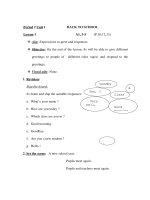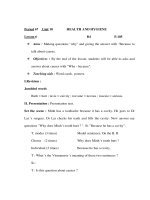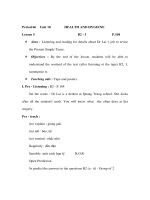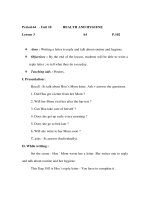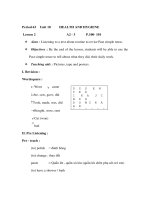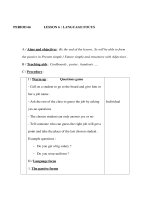Giáo án anh văn lớp 6 tuần 10
Bạn đang xem bản rút gọn của tài liệu. Xem và tải ngay bản đầy đủ của tài liệu tại đây (260.77 KB, 10 trang )
English lesson plan 6
Week: 10
Period: 28
School year: 2023-2024
Date of preparation: 04/11/2023
Date of teaching: 06/11/2023
UNIT 2: EVERY DAY
Lesson 5: 2C VOCABULARY (p. 42)
I. Objectives (learning outcomes):
By the end of this lesson, students will be able to:
a. Knowledge:
- Learn vocabulary and pronunciation about free time activities.
- Know how to talk about what Ss like/love/don’t like/hate to do in free time.
b. Core competence and language skills:
- Read the map and give directions.
- Build critical thinking, communication skills.
- Develop creativity.
- Sustain communitive dialogue.
c. Personal qualities:
- Build their interest in what they do in free time.
- Be collaborative and supportive in pair work.
II. Teaching aids:
- Teacher’s aids: student book and teacher’s book, class CDs, IWB software, PPT,
projector/interactive whiteboard/TV (if any).
- Students’ aids: Student books, notebooks.
Procedures:
A. Warm-up: (5 minutes)
a. Objectives: to introduce the new lesson and set the scene for Ss to acquire new
language; to get students' attention at the beginning of the class by means of enjoyable
and short activities as well as to engage them in the steps that follow.
b. Content: Kim’s game
c. Expected outcomes: Ss can review vocabulary about free time activities.
d. Competence: communication, collaboration, analytical thinking skills
e. Organization:
T’s activities
Ss’ activities
Content
- Show six pictures on the
Game: Kim’s game
screen in 30 seconds, then
- Play the games
ask Ss to guess and
in group and try
remember what activities in to remember the
the pictures.
pictures
- After 30 seconds, who
can tell the correct answers
is the winner.
Answer keys:
Nguyen Le Kim Nhan
Nam Nung Secondary school
1
English lesson plan 6
School year: 2023-2024
- Listen to music- Go bowling - Chat
online
- Play board games - Watch film
- Do puzzles online
B. New lesson: (35 minutes)
1. Activity 1: (10 minutes)
a. Objectives: to present the vocabulary related to free time activities.
b. Content: Vocabulary related to free time activities.
c. Expected outcomes: Ss can pronounce and understand the vocabulary related to free
time activities.
d. Competence: communication, collaboration, critical thinking skills and creativity
e. Organization:
T’s activities
Ss’ activities
Content
Task 1. Listen and repeat. (2.7)
- Tell Ss to look at the
- Listen and
1. Listen to music
numbered pictures.
repeat chorally 2. Do puzzles online
- Play the recording
and/or
3. Chat online
with pauses for Ss to
individually.
4. Hang out with friends
repeat chorally and/or
- Take notes
5. Play board games
individually.
6. Do jigsaw puzzles
- Check Ss’
7. Go to the theatre
pronunciation and
8. Go bowling
intonation.
9. Watch a film
10. Go skateboarding
11. Go to the mall
12. Go to the amusement park
- Draw the circles on
the board and write
the
Go
skateboa
words in each circle.
rding
- Ask Ss to read aloud
the words and Goclear
to
Listen
the
them.
amusem
to
music
ent
Checking understanding: What and
Where
Go to
-theRead aloud
mall words
the
- Rewrite the
Go
words in the
bowlin
g right circles.
Listen
to
music
park
Watch
a film
Go to
Do
puzzles
online
Play
board
games
the
- Check Ss’ answers.
theatre
Nguyen Le Kim Nhan
Hang out
with
friends
Do jigsaw
puzzles
Nam Nung Secondary school
2
English lesson plan 6
School year: 2023-2024
2. Activity 2: (10 minutes)
a. Objectives: to help Ss practice talking about free time activities
b. Content: speaking
c. Expected outcomes: Ss can talk about free time activities
d. Competence: communication, collaboration, critical thinking skills and creativity
e. Organization:
T’s activities
Ss’ activities
Content
- Read the Note!
- Listen and
Note!
box.
take notes
We use –ing form after the verbs
like/love/don’t’like/hate/
- Explain the
- Work in
Ss work in pairs. One S mimes activities from
activities. (give an
pairs to
Exercise 1. The other S says what he/she
example/ examples) complete the likes/doesn’t like doing in his/her free time.
activity.
3. Activity 3: (15 minutes)
a. Objectives: to help Ss to apply their language in the real situation.
b. Content: task 2- speaking
c. Expected outcomes: Ss can talk about what they like/ love/ dislike/hate doing in their
free time
d. Competence: communication, collaboration, critical thinking, presentation skills and
creativity
e. Organization:
T’s activities
Ss’ activities
Content
- Explain the task and - Tell their
Task 2. Which of the activities in Exercise
read out the example. partner about the 1 do you like/love/not like/hate doing in
- Ask Ss to tell their
activities they
your free time? Tell your partner. You
partner about the
like/ love/
can use your own ideas as well.
activities they
dislike/hate doing
like/love/dislike/hate in their free time. Example: In my free time I like chatting
doing in their free
- Present in front online and hanging out with my friends. I
time.
of the class
don’t like going to the mall. I hate playing
- Monitor the activity
board games.
around the class and
then ask some Ss to
tell the class.
C. Consolidation (3 minutes)
- Vocabulary about free time activities.
- Talk about free time activities.
D. Homework assigned (2 minutes)
- Learn vocabulary about free time activities.
- Do exercises in the workbook (page 24)
Nguyen Le Kim Nhan
Nam Nung Secondary school
3
English lesson plan 6
Week: 10
Period: 29
School year: 2023-2024
Date of preparation: 06/11/2023
Date of teaching: 08/11/2023
UNIT 2: EVERY DAY
Lesson 6: 2D EVERYDAY ENGLISH (p. 43)
I. Objectives (learning outcomes):
By the end of this lesson, students will able to:
a. Knowledge:
- Make invitations – accept/refuse.
- Act out a dialogue, to pronounce /θ/ , /ð/.
- Read for cohesion and coherence.
b. Core competence and language skills:
- Practise describing their home, act out a dialogue, role play a dialogue.
- Build up communication skills.
- Express information.
- Sustain communitive dialogue.
c. Personal qualities:
- Encourage them to study hard.
II. Teaching aids:
- Teacher’s aids: student book and teacher’s book, class CDs, IWB software, PPT,
projector/interactive whiteboard/TV (if any).
- Students’ aids: Student books, notebooks.
Procedures:
A. Warm-up: (5 minutes)
a. Objectives: to introduce the new lesson and set the scene for Ss to acquire new
language; to get students' attention at the beginning of the class by means of enjoyable
and short activities as well as to engage them in the steps that follow.
b. Content: accepting and refusing
c. Expected outcomes: Ss can learn some expressions to accept or refuse something.
d. Competence: communication, collaboration, analytical thinking, classification skills
e. Organization:
T’s activities
Ss’ activities
Content
- Write the
- Classify them Classify the responses into 2 categories:
responses on the
into 2
Accepting or refusing.
board and ask Ss to categories:
- Ok.
classify them into 2 accepting or
- I think so.
categories:
refusing.
- I’m afraid I can’t.
accepting or
- Sure. I’d love to
refusing.
-Sorry, I can’t.
- Check Ss’
Answer key:
answers.
Accepting
Refusing
Nguyen Le Kim Nhan
Nam Nung Secondary school
4
English lesson plan 6
School year: 2023-2024
- Ok.
- I think so.
- Sure. I’d love to.
- I’m afraid I can’t.
- Sorry, I can’t.
B. New lesson: (35 minutes)
1. Activity 1: (15 minutes)
a. Objectives: to present functional language
b. Content: speaking and functional language
c. Expected outcomes: Ss can use functional language correctly.
d. Competence: communication, collaboration, critical thinking skills and creativity
e. Organization:
T’s activities
Ss’ activities
Content
Task 1. Complete the dialogue. Use the
- Read out the phrases - Work in closed sentences (A-E)
and give Ss time to use pairs to use the
them to complete the
expressions to
Helen: Hi, Nat!
dialogue. Ss work in
complete the
Nat: 1) Hi, Helen. How are you?
closed pairs.
dialogue.
Helen: I’m OK. And you?
Nat: 2) I’m fine, thanks. Hey, are you free
this afternoon?
Helen: I think so. Why?
Nat: 3) Can we go to the mall?
Helen: Sure. I’d love to. What time?
Nat: 4) Let’s meet at 4 o’clock.
Helen: Sorry, I can’t make it at 4:00. I
have football practice at school until 5:00
Nat: 5) How about 5:30 then?
Helen: 5:30 is fine. See you!
Task 2. Listen and check. Act out
- Play the recording.
- Listen and
dialogue in pairs. (2.8)
Ss listen and check
check the answer. Answer key
their answers to
- Work in pairs to 1) Hi, Helen. How are you?
Exercise 1.
act out the
2) I’m fine, thanks. Hey, are you free this
- Ss take roles and act dialogue
afternoon?
out the dialogue.
3) Can we go to the mall?
4) Let’s meet at 4 o’clock.
5) How about 5:30 then?
2. Activity 2: (10 minutes)
a. Objectives: to help Ss roleplay a dialogue and practise pronouncing /θ/, /ð/.
b. Content: speaking- task 3 and pronunciation.
c. Expected outcomes: Ss can roleplay a dialogue and pronounce /θ/, /ð/ correctly.
d. Competence: communication, collaboration, critical thinking skills and creativity
Nguyen Le Kim Nhan
Nam Nung Secondary school
5
English lesson plan 6
e. Organization:
T’s activities
- Explain the task and read
out the example.
- Read out the phrases and
give Ss time to use them
to complete the
exchanges.
- T: Explain the task, then
play the recording.
- T: Check Ss’ answers.
- T: Play the recording
again.
School year: 2023-2024
Ss’ activities
Content
Task 3. Complete the exchanges with
the sentences below.
- Complete the
task individually
and share with
Answer key
their partners
2. I’d love to
3. I can’t make it
4. How about 7:00 then?
Pronunciation
- Listen and tick Listen and tick (✓). Listen again and
the correct box. repeat. (2.9)
- Listen and
Answer key:
repeat either
chorally or
individually.
3. Activity 3: (10 minutes)
a. Objectives: to help Ss apply apply the lesson in the real situation.
b. Content: acting a dialogue.
c. Expected outcomes: Ss can roleplay a life like dialogue about asking someone out.
d. Competence: communication, collaboration, critical thinking, presentation skills and
creativity
e. Organization:
T’s activities
Ss’ activities
Content
Task 4. You want to go to the cinema
- Read out the Study
- Listen and take this Saturday with your friend.
Skills box.
notes
Act out a dialogue similar to the one
- Explain the situation
- Act out a
in Exercise 1. Mind the sentence
and ask Ss to take roles
dialogue similar
stress
and act out a dialogue
to the one in
similar to the one in
Exercise 1.
Exercise 1.
- To help Ss, draw the
- Complete the
following diagram on the task in pairs.
board and elicit
appropriate phrases Ss
should use. Write them
on the board. Ss can refer
to the diagram while
doing the task.
Nguyen Le Kim Nhan
Nam Nung Secondary school
6
English lesson plan 6
School year: 2023-2024
Suggested Answer Key
A: Hi James!
B: Hello Rachel. How are you?
A: I’m great, thanks. Are you free on
Saturday?
B: I think so. Why?
A: Can we go to the cinema?
B: I’d love to. What time?
A: Is 5:30 p.m. OK with you?
B: I’m afraid I can’t make it. I have
basketball practice until 6:00 p.m.
A: How about 7:00 p.m. then?
B: 7:00 p.m. is fine. See you!
C. Consolidation (3 minutes)
- Pronounce /θ/, /ð/correctly.
- Structures to make invitations and responses (accepting/refusing).
D. Homework assigned (2 minutes)
- Practise 2 sounds /θ/, /ð/.
- Do exercises in the workbook (page 25)
Nguyen Le Kim Nhan
Nam Nung Secondary school
7
English lesson plan 6
Week: 10
Period: 30
School year: 2023-2024
Date of preparation: 07/11/2023
Date of teaching: 09/11/2023
UNIT 2: EVERY DAY
Lesson 7: 2E GRAMMAR (p. 44)
I. Objectives (learning outcomes):
By the end of this lesson, students will be able to:
a. Knowledge:
- Learn adverbs of frequency.
- Review present simple.
- Review daily routines.
b. Core competence and language skills:
- Talk about daily routines.
- Improve their communication skill.
- Improve their critical thinking.
c. Personal qualities:
- Build their positive daily routine.
II. Teaching aids:
- Teacher’s aids: student book, workbook and teacher’s book, class CDs, IWB
software, PPT, projector/interactive whiteboard/TV (if any).
- Students’ aids: Student books, workbooks and notebooks.
Procedures:
A. Warm-up: (5 minutes)
a. Objectives: to introduce the new lesson and set the scene for Ss to acquire new
language; to get students' attention at the beginning of the class by means of enjoyable
and short activities as well as to engage them in the steps that follow.
b. Content: adverbs of frequency.
c. Expected outcomes: Ss can remember adverbs of frequency.
d. Competence: communication, collaboration, analytical thinking skills
e. Organization:
T’s activities
Ss’ activities
Content
- Write on the board
Arrange these words into the right order
words and ask Ss to
- Arrange adverbs of frequency.
arrange them into the
of frequency into usually / often / never / sometimes / always
right order of
the right order of
frequency. (books
frequency. (books Answer key
closed)
closed)
1. always
- Check Ss’ answer.
2. usually
3. often
4. sometimes
5. never.
Nguyen Le Kim Nhan
Nam Nung Secondary school
8
English lesson plan 6
School year: 2023-2024
B. New lesson: (35 minutes)
1. Activity 1: (10 minutes)
a. Objectives: to present and practise adverb of frequency.
b. Content: Adverbs of frequency
c. Expected outcomes: Ss can express grammatical relationships in spoken utterances at
the level of the sentence.
d. Competence: communication, collaboration, critical thinking skills and creativity
e. Organization:
T’s activities
Ss’ activities
Content
- Read out the theory
- Read and take
Note!
and the cartoon. Elicit/ notes
Adverbs of frequency show how often we
Explain what these
do something. We put them after the verb
adverbs show (show
to be but before the main verb.
how often we do
something).
- Read out the Note!
box.
- Complete the
sentences
- Give Ss time to
referring to the
complete the sentences table as
referring to the table as necessary.
Task 1. Read the theory box. Then write
necessary.
the correct adverb of frequency.
Answer key
- Check Ss’ answers.
1. always
2. usually
3. often
4. sometimes
5. never
2. Activity 2: (15 minutes)
a. Objectives: to help Ss practise adverbs of frequency and word order.
b. Content: adverbs of frequency
c. Expected outcomes: Ss can use adverbs of frequency in their own situation.
d. Competence: communication, collaboration, critical thinking skills and creativity
e. Organization:
T’s activities
Ss’ activities
Content
Task 2. Put the words in the correct
- Elicit where in the
- Complete the order.
sentence the adverbs of
task
Answer key
frequency appear.
individually
1. He is always early for work.
- Explain the task and
and then share 2. She is sometimes late.
Nguyen Le Kim Nhan
Nam Nung Secondary school
9
English lesson plan 6
give Ss time to complete
it.
- Check Ss’ answers.
- Explain the task and
give Ss time to think
about their answers.
- Read out the example
sentences and then ask
various Ss to present the
daily routine of their
famous friend to the
class.
School year: 2023-2024
with their
friends
3. He usually takes a shower in the evening.
4. They often go to the park on Sundays
- Complete the Task 3. Put a tick (✓) in the correct box.
task
Then tell your partner.
individually
and then share Suggested answer key
with their
Mark is a famous singer. He never goes to
friends
school.
- Present the
He always eats lunch in a restaurant.
daily routine
He often goes to the gym in the afternoon.
of their famous He usually goes to bed late.
friend to the
class.
3. Activity 3: (10 minutes)
a. Objectives: to help Ss apply their language in the real situation.
b. Content: your friend’s daily routine
c. Expected outcomes: Ss can talk about their friend’s daily routine
d. Competence: communication, collaboration, critical thinking, presentation skills and
creativity
e. Organization:
T’s activities
Ss’ activities
Content
Task 4. Imagine your friend is a famous
- Explain the task and
- Work in pairs
person. What is his/her daily routine
give Ss time to think
to complete the like?
about their answers.
task.
- Read out the example
- Present the
Suggested answer
sentences and then ask
daily routine of Mark is a famous singer. He never goes to
various Ss to present the their famous
school.
daily routine of their
friend to the
He always eats lunch in a restaurant.
famous friend to the
class.
He often goes to the gym in the afternoon.
class.
He usually goes to bed late.
C. Consolidation (3 minutes)
- Learn adverbs of frequency.
- Review present simple.
- Review daily routines.
D. Homework assigned (2 minutes)
- Learn adverbs of frequency
- Do exercises in the workbook (page 25)
Nguyen Le Kim Nhan
Nam Nung Secondary school
10




